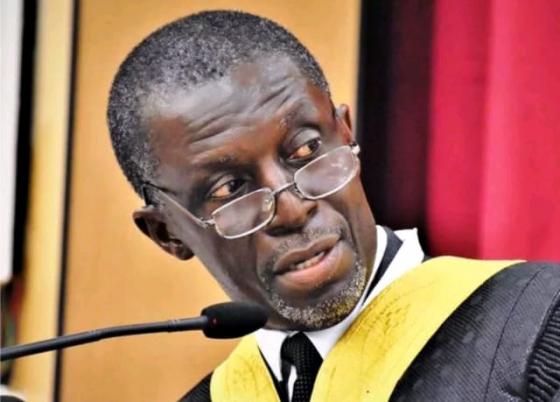Cllr. Gongloe Attends Confab for Criminal Tribunal in The Gambia

Cllr. Tiawan S. Gongloe, Former President, Liberia National Bar Association.
The President of the Liberian National Bar Association (LNBA), Counselor Tiawan Gongloe, is among several legal experts attending a conference in The Gambia to review the statute on the establishment of a criminal tribunal for crimes that took place during the regime of former Gambian President Yahya Jammeh from 1994 to 2017.
The conference, according to a release from the LNBA, is intended to review The Gambia’s Truth, Reconciliation and Reparations Commission (TRRC), reports reviewing a draft statute on the establishment of a criminal tribunal for the prosecution of crimes against humanity in The Gambia under former President Yahya Jammeh’s rule.
In the end, the release added, participants will then submit to the TRRC a roadmap on the way forward towards the court prosecution. The three-day gathering brings together international legal experts, including Stephen Rapp, former chief prosecutor of the Special Court for Sierra Leone.
Other legal minds include Femi Falana San, a leading human rights lawyer in West Africa; Reed Brody, from the International Commission of Jurists; Howard Varney, representative of the International Center for Transitional Justice; and Amie Bensouda, a celebrated Gambia Jurist and lead Counsel of the Jammeh Commission.
Cllr. Gongloe was invited by the President of the Gambian Bar Association, which assembles some of the finest legal minds in Africa and beyond.
Yahya Jammeh
Former Gambian President Yahya Jammeh seized power from the country’s first President, Sir Dawda Jawara, as a young army lieutenant.
29-year-old Lieutenant Jammeh rose to the self-selected official title, “His Excellency Sheikh Professor Alhaji Dr. Yahya Abdul-Aziz Awal Jemus Junkung Jammeh Naasiru Deen Babili Mansa” before his exile 22 years after his first election in 1996.
His defeat by opposition coalition leader and real estate developer, Adama Barrow, in the December 1 election, came as a shock to many who witnessed his disputed election victories in 2001, 2006, and 2011.
The surprise stemmed from the fact that Jammeh had lost despite his very stern and controversial character, feared by many in the country due to his influence and use of the military and state to execute his wishes.
The surprise waned when he backtracked on his acceptance of defeat to annul the election results and called for a rerun as a result of suspicions of electoral malpractice “realized after his investigation”.
The Gambian army quickly supported him while fearful citizens and officials fled the country to avoid any possible danger. Jammeh further proclaimed a state of emergency after the courts failed to hear his election petition and inauguration injunction cases due to the unavailability of judges.
It took a series of unsuccessful mediation by leaders of the ECOWAS bloc and threats of military intervention to come to an agreement brokered by Guinean President Alpha Conde and Mauritanian President Mohamed Ould Abdel Aziz.
Adama Barrow was strategically taken out of the country by ECOWAS leaders and later sworn in as president at the Gambian embassy in Senegal when the agreement was at its peak.
Jammeh a father of two and husband of two wives, who came to power as a hero to many in the fight against corruption and lack of democracy, left the country as an exiled former head of state and a hero to a few who thronged the airport to see him leave alongside dozens of luxury vehicles and property
Gambian victims, families of victims and the world will, however, never forget Jammeh’s strict laws and abuses against the media and press freedom, opposition figures, demonstrators, workers, officials, and all those who go against him.
The new Gambian President Adama Barrow pledged to launch a truth and reconciliation commission to investigate possible crimes committed by his predecessor Yahya Jammeh.
Before the trip, Cllr. Gongloe had attended a consultative meeting of the West Africa legal experts in Accra, Ghana recently.
The meeting was held under the joint sponsorship of the Economic Community of West Africa (ECOWAS), and the Center for Democracy and Development on expanding the jurisdiction of the ECOWAS Court for the prosecution of international crimes committed in West Africa. It also focused on the revival of the West African Bar Association (WABA).
